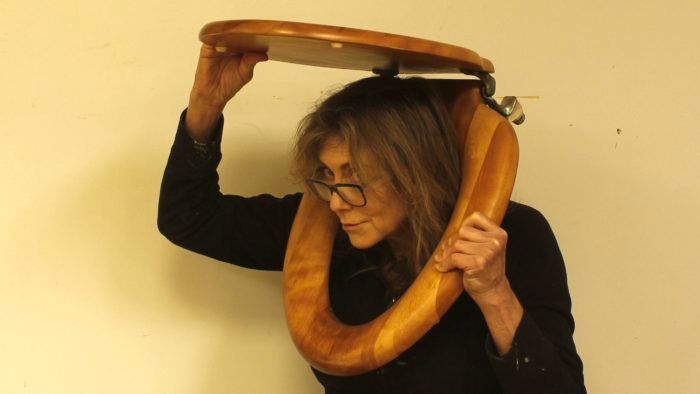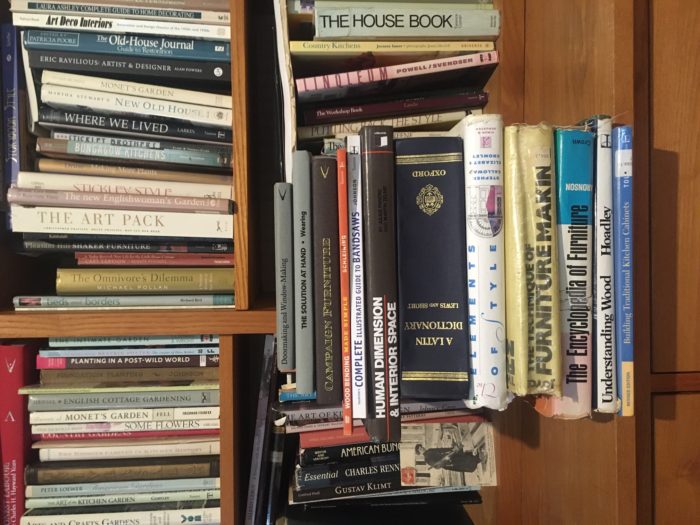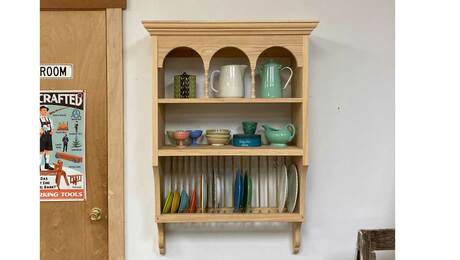“Dear Nancy”
That 'free advice' you asked for on social media? It's worth its weight in thank-yous.
Dear Nancy,
Ever since the publication of my book about building custom hardwood toilet seats, people have been sending me private messages on social media asking for related advice. Private messages on social media! A lot of these questions involve so many variables that it would take me an hour to answer even one of them adequately. For example:
“I have a magnificent offcut of pomelé mahogany and desire to craft a seat with no joints, simply cutting the outer shape from the 16 inch by 24 inch blank, on my bandsaw, then removing the center portion with the scroll saw. I assume the grain should be oriented longitudinally. Hence my question: Should I be concerned about short grain breakage at the ends, especially given the stress from being screwed (to the hinges) at the rear?”
or
“Yo. Thinkin bout makin a lil end grain butcher block seat outta ebony. With hand cut dovetails natch.”
The writer apparently got distracted here and sent the rest in another message.
“With so many joints on the surface do you think the epoxy might make my butt break out even after the glue cures. LOL. Thoughts?”
By the way, I’m fairly certain these inquiries were sincere, not jokes from friends.
I’ve lost track of how many snarky replies I’ve painstakingly pecked out with one finger on my phone, only to delete them before sending (well, most of them; a couple of times I pressed send and then regretted it). Do these people honestly think I have nothing to do all day but sit around and give out free advice? Just about every article or blog post I write makes clear that my livelihood depends on building these handcrafted, personally fitted pieces (and other commissions) for a living. How do people not get that my time is valuable!!! It’s especially obnoxious when most of the stuff people ask about is covered in the book. I don’t want to insult anyone, but I’m at my wits’ end as to how I should reply, other than with “BUY THE DAMN BOOK.” Can you help?
–David
David,
We live in interesting times. It has become commonplace for many in the “sharing economy” not to blink an eye as, on the one hand, they balk at paying for a subscription to a newspaper or trade journal written by experienced professionals and edited to ensure clear, factual content, and on the other, expect to be paid well for their own work.
Rarely does a day go by without me seeing a loving testimonial to the great community of woodworkers on Instagram, in particular, where many of us post information about processes, etc., that we want to share freely. I give away tons of information there and elsewhere, along with advice to many who request it; I also appreciate as much as anyone the camaraderie and inspiration to be gained through this contact with fellow woodworkers, gardeners, and artists. But I throw up a little in my mouth when expressions of gratitude to so-and-so for generously consulting on a finish that has already been detailed in several articles I’m aware of, or to such-and-such for recommending their plans for a cross-cut sled (ditto), come from people who routinely post images of their spacious, well-equipped workshops and international vacations. Dammit, what about books and magazines?! They’re troves of information and insight. The readiness to ask questions via direct message instead of taking the time to look things up irks me all the more because I know how diligently, and often selflessly, the editors and writers at many paywall-protected publications work. Don’t get me wrong; I appreciate the value of personal experience in weighing pros and cons when there’s a variety of solutions to a given problem. But the increasingly automatic jump to ask a social media contact for advice before even doing an internet search on the topic is getting out of hand.

Still, this is where we find ourselves…at a moment in which social media, and the internet more generally, have magically made the economic connections between “creating content” (barf) and “consuming” it (barfing again!) disappear – poof! – leaving many of our fellow woodworkers feeling like saps for shelling out the price of two lattes a month for enough information to train themselves from rank beginners to skilled furniture makers.
I fear the “sharing economy” that many consider an antidote to the evils of private property and a market that runs on money is too often simply a disruptor of small business as it has long been done – and not one that delivers us from the less benign effects of entrenched economic realities in any meaningful way. Rather, it strikes me as a sort of leech on the thigh of the family-owned hardware store, small-town cab company, or code-compliant hotelkeeper (all of whom some acquaintances of mine dismiss as benighted members of the “petty bourgeoisie,” even as their own salaries are delivered to their bank accounts via institutions funded in good part by taxes paid by these proletarians); it promises to help those of little means, yet still depends on – and sometimes generates – concentrations of wealth. I’m looking at you, Uber! And don’t get me started on Airbnb, which is transforming affordable neighborhoods and luxury mountaintop retreats alike into short-term digs for one-step-up-from-#vanlife adventurers.
In the meantime, this culture of friends who have never met, few of whom really know anything about each other beyond the illusory world of edited images shared on-screen, encourages some to imagine themselves entitled to the benefits of friendship as historically understood. A longtime friend whose wedding I attended, who showed up years later for my stepson’s memorial, might want my thoughts on whether to salvage her 1920s windows, so we get together and check them out over coffee. I ask another friend, who’s now retired, if he’d be willing to help install the slider on my tablesaw; I offer to pay him, but he says no, so I take him out for lunch instead. In these friendships, reciprocity is central. But have you noticed how often, when you do take the time to provide detailed information in response to a private request on social media, the person who made it doesn’t even have the courtesy to reply with so much as “Thanks”? Who are their parents?!
Forgive my digression. Here’s a suggestion for how you might answer those requests: “With only so many hours in each day, I am unable to answer individual requests for advice. I cover the topic you’ve asked about (and much more) in my book, which is available here.
***
Thanks to Lee and Eric Sandweiss for providing the vintage mid-century toilet seat and to Chris Schwarz for making me aware of LMGTFY.
You can find more examples of exasperating experiences from the world of professional woodworking in Making Things Work.
 |
|
 |
|
 |






















Comments
Thank you SO MUCH for this article! I thoroughly enjoyed it during my lunch break. It made me remember 10 or 12 years ago when I first started working in cabinet shops, and my friend and I after leaving work, would get a coffee and go spend hours in the public library pouring over design, woodworking and fine art books. I remember the amazing feeling of carrying an armload over the table and admiring the pile before digging in, in total awe of all the information that was there ready to learn. Perhaps because of this romantic start in my early craft days, and my inclination toward reading in general in addition to woodworking, I continue to take every possible opportunity to accumulate a new book. And of course I look up things on Fine Woodworking, and usually my first go to is to ask one of the many skilled people in my IRL woodworking world. Anyway, good stuff.
The author moans,
"I fear the “sharing economy” that many consider an antidote to the evils of private property and a market that runs on money is too often simply a disruptor of small business as it has long been done – and not one that delivers us from the less benign effects of entrenched economic realities in any meaningful way. Rather, it strikes me as a sort of leech .....(snip); it promises to help those of little means, yet still depends on – and sometimes generates – concentrations of wealth".
You seem to have lumped hobbyists making things at cost or free for others in with vast neolib damagers like Uber and AirB&B. That's unjust.
In fact, many small furniture making businesses such as that of N Hiller are likely to sell only to people with lots of money to spare, not to the hoi-polloi who are living hand-to-mouth on their newly reduced zero hour contract pittance. But this is an old, old story - the high-minded producers of quality find that the overheads and costs of their quality means only the rich can afford them. (See William Morris for details).
I make what I think is high quality furniture as a hobby, much of which I give to people for nothing. This doesn't detract from the business of N Hiller or those like it, as the recipients of my furniture couldn't ever afford the prices such producers will charge for a similar thing. The recipients of my hobby output would have to make do with a collection of saggy chipboard pieces from Ikea if they didn't get my zero-price hobby-product.
And when they bring me a basket of their eggs, a bag of tatties and some old wood they found, in return ......... Does the local supermarket lose out? No. I wouldn't buy their tortured-animal or rip-off-a-farmer Roundup-drenched stuff anyway.
*****
The enemy of small businesses is not a caring-sharing alternative economy of old hippies exchanging their hobby-craft stuff. Your enemy is Big Business and it's monocultural, monopolising efforts to obliterate all competition by offering glamorous dross produced by ever poorer wage slaves to the dafties who buy it because an advert man hypnotised them into doing so and dross is all they can afford.
Lataxe
I did not mean to imply (nor did I state expressly) that this post was about the kind of sharing you do. i’m sorry that you inferred something that I don’t believe is in the post. To the contrary, what you are doing is genuine sharing and involves the kind of reciprocity that characterizes a true sharing economy. This is why I used quotes around “sharing economy” —to differentiate between them. The post critiques the cynical appropriation of the concept and practice of “sharing“ by powerful interests that seek to profit by enabling super-easy virtual connection. I’m sorry that you made the inference you did because based on your reply, I think we are largely in agreement on the points you raise. You don’t need me to tell you that you are doing good work. You know it already. I salute you for it.
I'm in a totally unrelated area but face the same issue. I stopped the free advice. All regular clients get free discussions by phone any time of day or night (well, almost). but folks too lazy to call university extension or other places--sorry, no go. My work time is dedicated to the person I'm at, & other time is either office work or free time. I have regular customers, not the one-time issue, so they are paying my income. I'm happy to do the one-time things, but they pay like everyone else. I thought I could build my business by answering everybody all the time--nope! those who are serious will hire me & the others....not I. Nancy is absolutely correct
I appreciate Nancy's willingness to share her experiences, not only in the Pro's Corner, but also in her book - Making Things Work: Tales from a Cabinetmaker's Life. There is much to be said about an artisan's journey, as the artisan's work is not just a piece of furniture but is a story. Many thanks to any "pro" who is willing to share, as her time is valuable and experience is priceless.
Well written article. It applies to other than 'business' as well. I'm retired and make/do things for family and friends who seem to appreciate it. A few days ago, I was contacted by an acquaintance who asked if I could 'look at this handmade gift and determine if it is repairable' (the unspoken undercurrent being 'will you fix this for me?). After looking at the pictures she sent, I briefly described how to make the repair. She wrote back saying (essentially) that she couldn't do it. I told her that if I had something I didn't feel comfortable fixing that I would contact (gave her the name of a local furniture repairer) and see if he could do it.
Sharing is wonderful and it's a two way street. I'm concerned that not only has the concept of sharing been maligned, it's been affected by the idea of instant gratification. Skilled craftspersons are able to do what they do because they invested the time and energy to learn how. I suggest to 'one-way calllers' that they go and do likewise...
Log in or create an account to post a comment.
Sign up Log in